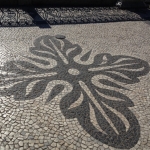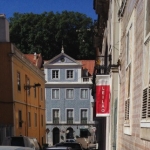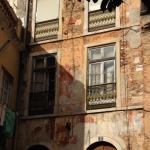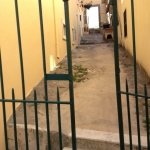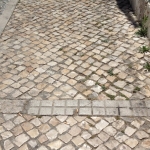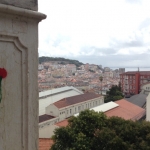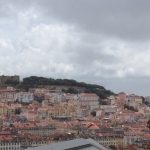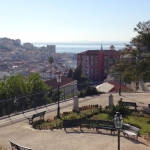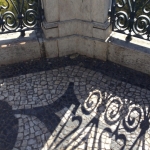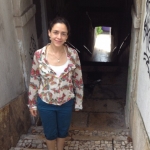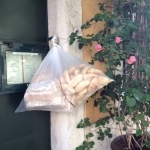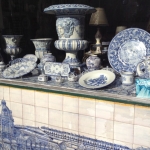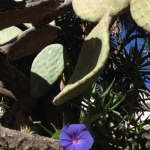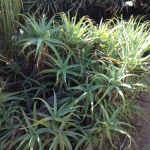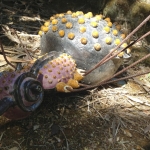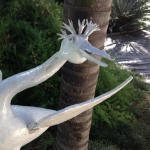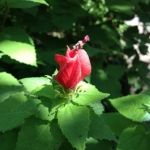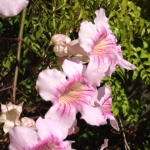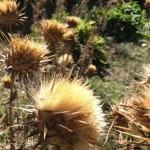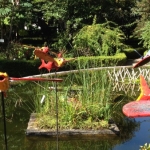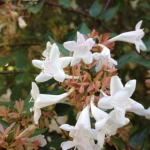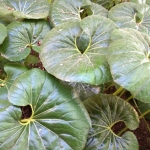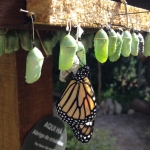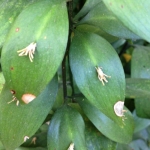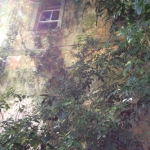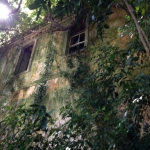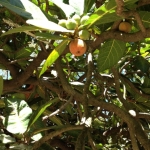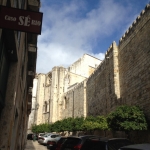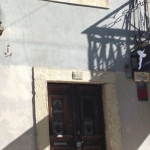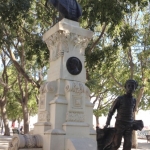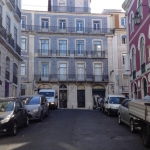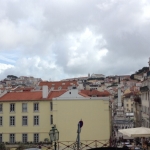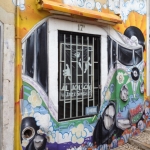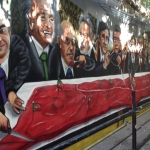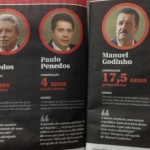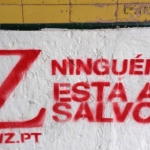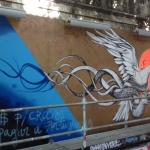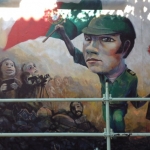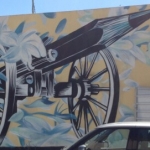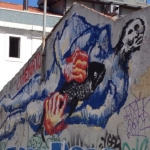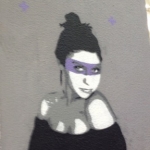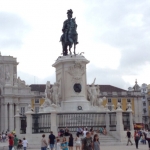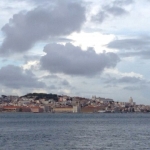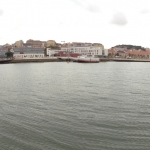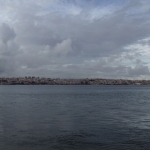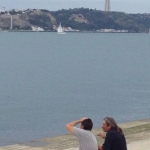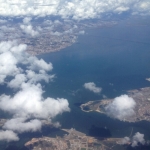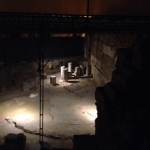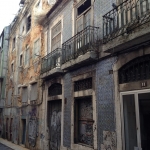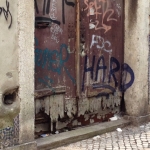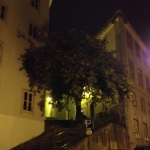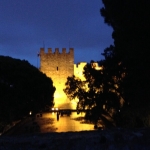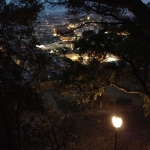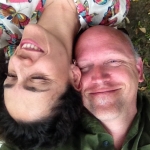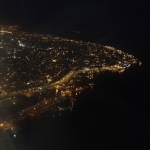Lisboa, Portugal
I should think that at some point writers (insert: travelers, artists, readers, wanderers) would have taken in enough sights and scenes, they might permanently retire to their rooms like Sri Aurobindo, spending the rest of their days quietly reciting the poem of what had been seen. Wouldn’t a mariner look one day upon yet another new bay, or new port, and say: There is one ocean: I have sailed it again and again. A breeze is a breeze, and a wave is a wave; a shore is a shore, and a landing a landing.
Maybe that’s how it should be, but I apparently have not arrived at that shore. I am sitting on the third floor of a building made pousada in the old port area of Lisbon. The sun sparkles off the water – large sparkles where it reflects near the boardwalk, and smaller and smaller flecks as you look outward across the bay toward the coast opposite, until they merge into a shimmer, then a sheen, than a general brightness – and here beneath my high perch tourists swim along in sluggish, colorful currents, that whisper over the cobblestones (of their individual watercourses) in a multitude of languages.
We landed at night, and caught a cab with a grumbling driver, who took us the long way ’round, and whose gruffness only softened once I had over-complimented him on finding his way through the crookedly narrow streets of Alfama to our bed and breakfast. Bem feito, mestre, obrigado. Well, it wasn’t all that well done, actually, and he was not so much of a mestre, having called for directions from his office. But it was worth it for us, apparently worth it for him, and we had arrived in Lisbon.
The road we had taken was through a pretty dense and industrial part of town, along the working port and on expressways that left an impression of weight and obscurity. As the light fell, my spirits fell a bit as well. There was something a little haggard about the presentation, and while we all grow more haggard and human constructions do, too, still to feel a little younger and more sprightly is preferred, and available, and this ride in was… not depressing, exactly: rather, deflating. Yet there was also something engaging in that first night, the city tumbled over itself from hilltops to the port, and the houses in those older parts of town seems to hug each other, or lean in shoulder-to-shoulder, in the comfort that comes from long companionship, accepting the quirks and crumbling façades along with the ancient dignity that is only slightly hidden behind the decadence.
Travel for us is like a job: Cata gets up and goes off to her work, which is day-long interviews with as many as a dozen people, almost non-stop; and I head off to mine, a walking tour of every corner of habitation that looks promising or dis-promising, avoiding those places that are too “special” and touristic, that you visit once and then never again, to try to understand what taking root might mean. Better said, there are three trips taking place at once: Cata’s study of opportunities, my study of realities, and the time before or after or between, when she and I are able to tour a bit. That third of course includes a debrief of the day’s discoveries, which is no small thing. I would have to say that we mostly spoke and touched and were silent in the mornings and evenings, to bring us back to some sympathetic union from amazing distinct kinds of involvement, with a few days here and there on the weekends for a little escape from the intensity of that work.
My walking tour made for greater access to unstructured time and an inquisitive eye. Our hosts – a French couple who had been living as ex-pats in Lisbon for some years (they really love the place for quality of life and as a place to raise their kids) – showed me their favorite local spots on the free tourist map, and on day one went off to that pleasurable work through the charmingly labyrinthine streets portside.
Up the Rua de Alecrim (Rosemary Road) to the parks that ride that ridge. The Turim Suisso Atlântico overlooks the southern basin of the city, all the way up to the tree-crowned castle summit; to the Praça Principe Real and its human-sized cafés (and their mille-feuille custard tarts and coffees); along to the museum of science and its accompanying botanical and teaching gardens.
Objectively, cities have their charms and strengths, their somehow-balanced economies, and luxuries and frugalities. Subjectively, I have to allow the fact that my well-being comes from green spaces, and invariably I will seek out the squares of green on their maps. If I want to know how a city lives, I follow the tracks of people; but if I want to know how it breathes, I follow the disjointed lines of cultivated green that the best communities not only protect and maintain, but share among the prosperous and less-advantaged of their number. I paid a couple of euros to spend an hour or so with the earth, mid-Lisbon…
It was for me rejuvenation, and while the oldest trees were nowhere near as old as the oldest buildings I had passed, their life went deeper and their reach broader. As I left I ducked my head back into the ticket office, where a single Luso-african man had sold me my ticket an hour or so before. “Beautiful gardens! Thank you so much for taking care of them for us!” I said. He smiled happily, and shook his head sadly: “Deveria ser bem melhor…” it should be so much more. The economic crises of the present don’t seem to operate like the economic crises of the past, where wealth somehow rooted itself in the local soil, creating this castle, that museum, a garden. Now it fills private pockets that seem to open only inward, pay for trivial and ephemeral enjoyments, and not even a few dollars a year to spare of a few flowers and a few hands to water them.
Well, the castles still stand (if the mortar that holds them is eroded by wind and rain).
I walk the street and find public art, both sanctioned and in protest. I found several touches of the latter to add to my tip-of-the-hat to son Trip. The first two photos are interesting: I found the first on my walk through town, a row of parliamentarians who were cutting up the country like fresh meat, and the second the top news item, showing most of them sentenced to years in prison for influence peddling and graft. Which came first, the gilded chicken or the golden egg?
And then a little time together to discover our common Portuguese ground. At the port, with its maritime gates to the city guarded on horseback and on wing; by ferry across the water to the other side of the bay; to the unearned bones of Rome beneath the streets, and the decaying underbelly of old empire (as much a picture of ours as theirs); to rest in the public parks; to finally climb to the height of land, whose ramparts collect the most and last bit of light each day so generously offers…
Finally, a little homeward-leaning lift, up into the crowded airways of Europe, whose contrails track the migratory paths of all of us, bound away from homes and toward them, engaged in business that seems infinitely important but that is ultimately trivial, driven by what we know or what we do not, drawn by what we hope or what we dare not, as the big old globe turns quietly and patiently from day to day to day.
 Copyright secured by Digiprove © 2014
Copyright secured by Digiprove © 2014 
